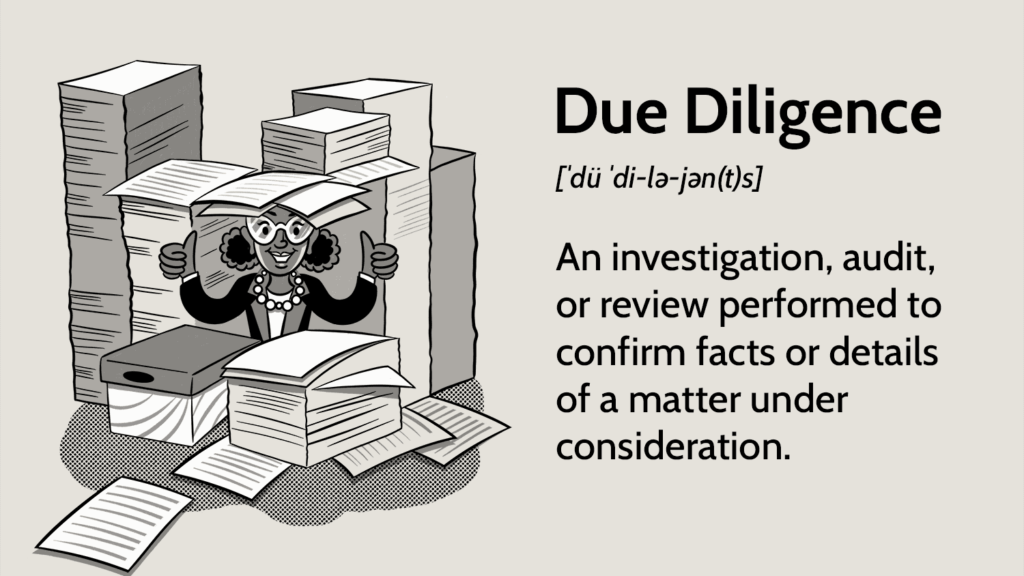

Before entering into a contract or agreement with another party, a reasonable firm or person is typically expected to conduct research or operate with a certain degree of care. Although it may be required by law, the term is more frequently used for volunteer inquiries.
According to the theory behind due diligence, carrying out this kind of research improves the quantity and quality of information available to decision-makers. Moreover, it assures that this information is used correctly to consider the issue and its costs, rewards, and risks.
Definition of Due Diligence
Due diligence, meaning in English, is a detailed analysis of a company conducted by a potential buyer to identify its assets and liabilities and evaluate its economic potential. Diligent meaning is that people are always looking for ways to improve things and are not afraid to ask for help when needed.

What is Due Diligence?
Due diligence verifies information before taking formal action, such as investing in a company. It includes researching a company’s financial statements and operations, interviewing management and other key personnel, and inspecting its premises. Due diligence is an important part of the investment process. It can help you make informed decisions about whether to invest in a company and help protect your money if the company turns out to be fraudulent or risky. When investing in a new company or venture, due diligence can be particularly important.
Understanding Due Diligence
Due diligence is a process used to ensure that an investment in a company or project is sound. It can include researching the company, its business model, and legal issues. Due diligence also includes verifying information about the company with third-party sources. Due diligence is a key part of investing and can help protect investors from bad decisions. It can also ensure that an investment is worth making. Due diligence is often used when purchasing a company or investment project.
By checking out the company’s background and financial stability, you can reduce your risk of being scammed or burned by an untrustworthy business. Due diligence is also often associated with the term “due care.” In legal jargon, due care means taking reasonable precautions to ensure that someone does not suffer loss or harm due to your actions. Due diligence certificate issued by a Notary Public or other appropriate official stating that the signer has taken all reasonable measures to investigate and determine the accuracy of information put forward in connection with a document.
For example, you wouldn’t open an unlocked door if you expected someone else to be inside. The same principle applies to business dealings: You should take all necessary steps to protect yourself and your money before making any decisions. Again, due diligence is an important part of the investment process.


Types of Due Diligence
There are different types of due diligence you should do when starting a business:
Financial Due Diligence
It involves calculating your startup’s estimated costs and revenues and verifying that you have the financial resources to carry out your business plan. You’ll also need to determine whether you can raise any necessary financing or sell assets before launching your company.
Legal Due Diligence
It includes researching applicable state laws and regulations, reviewing contracts with potential partners or clients, and consulting with attorneys about any intellectual property requirements for starting a business. Additionally, it’s important to determine whether you’ll need to register your business with the government and to identify any insurance requirements.
Social Due Diligence
It refers to conducting interviews and surveys of your target market, as well as surveying competitors to learn about their businesses and marketing strategies. You’ll also want to review consumer feedback and reviews of your proposed product or service. Each type of due diligence is important, and you should never embark on a business venture without completing all three types of due diligence.
How to Perform Due Diligence for Stocks?
The steps for carrying out due diligence for investors are listed below. Though most apply to bonds, real estate, and many other investments, they are frequently tied to stocks.
The firm’s quarterly and annual reports and company profiles on financial news and discount brokerage websites include all the information you require.
Analyze the Capitalization of the Company
You must first assess the company’s financial status to perform due diligence for stocks. You can do this by looking at its capitalization (the total amount of money a company has invested). A high capitalization indicates that the company is financially stable and has a lot of assets to invest in new projects. Conversely, a low capitalization suggests that the company may be in trouble and may not have enough resources available to grow or finance future ventures.
You can also analyze a company’s liquidity (the ability to liquidate its assets quickly) and solvency (its ability to meet its financial obligations). A company with a high liquidity and solvency score is likely to be able to sell assets quickly and pay its debts. Conversely, a company with low liquidity or solvency may not be able to meet its expenses for long periods.
Revenue, Profit, and Margin Trends
Another way to assess a company’s viability is by looking at its revenue, profit, and margin trends. This information can help you predict how the company will perform in the future and whether it has the potential for growth or decline.
You also should consider a company’s balance sheet (which details its assets and liabilities) and stock price (which reflects investor sentiment). A high stock price suggests that investors are optimistic about the company’s prospects, while a low stock price indicates pessimism or uncertainty about its long-term prospects.
Competitors and Industries
It would help if you also considered a company’s competitors and the industries in which it operates. This information can help you understand how the company will likely fare against rivals regarding market share, revenue, and profit.
You can also look at industry trends to better predict how the marketplace will respond to changes made by a competitor or new technology developed by one of its players.
Valuation Multiples
Another way to assess a company’s value is by using valuation multiples. These measures use data from past transactions to determine how much other companies are worth (based on revenue, profit margins, and stock prices). You can use these multiples to help you compare the relative values of different companies or analyze trends over time.
Company Background and History
When making an investment decision, it’s important to understand the company’s background and history. This information can provide insights into its corporate culture, management team, and strategy for growth or decline.
It can also help you form an opinion about the probability of success for the company’s proposed investment.
Management and Share Ownership
Another important factor to consider is management and the company’s share ownership. This information can help you determine whether your money will be well-spent and who will benefit if the investment fails. It can also provide clues about how likely insiders will make decisions that may not align with shareholder interests.
Balance Sheet
A company’s balance sheet is a snapshot of its assets, liabilities, and shareholder equity at a specific time. This information can give you an overview of the company’s financial health and prospects for growth.
Profit & Loss Statement
The profit and loss statement shows how much money the company earned during particular periods (in terms of gross profits or net income) compared to the total expenses incurred during that period. This information can help you determine whether the business is operating efficiently and making reasonable returns on your investment.
Cash Flow Statement
The cash flow statement provides insight into how much money the company has to fund its operations, including short-term (cash and cash equivalents) and long-term (debt and equity) financing. This information can help determine whether the business can meet its financial obligations in near-term and long-term situations.
Balance Sheet Accounts
The balance sheet also includes several accounts detailing a company’s assets, liabilities, and shareholder equity at various times. These reports can give you an accurate snapshot of how the company is performing financially relative to where it was.
Stock Price History
The stock price history report provides a chronological snapshot of the prices at which shares of a particular company have traded over the past several months. This information can help you determine whether the share price is undervalued or overvalued and whether there are any potential opportunities to purchase shares on sale. Industry Analysis
The industry analysis report provides detailed information on the competitive landscape and key macroeconomic trends affecting the company’s specific sector. This data can help you identify potential new opportunities or threats to the business’s bottom line and make informed decisions about where to invest your money.
Stock Dilution Possibilities
The stock dilution report estimates how many it may issue additional shares if the company’s current share issuances remain unchanged for a specified period. This information can help you determine whether there is potential for increased shareholder value as a result of future growth in the business.
Expectations
The expectations report provides a snapshot of how investors expect the company’s financial performance to unfold over the next 12 months. This data can help you make informed decisions about whether or not to buy shares in anticipation of future growth.
Examine Long and Short-Term Risks
The risks report provides a snapshot of the key factors that could affect the company’s financial performance over the next 12 months. This information can help you identify potential warning signs and make informed decisions about whether or not to invest in the business.
Due Diligence Basics for Startup Investments
When making a startup investment, you should do some basic things to ensure that your money is well spent. Here are four tips:
1. Do Your Research
Before investing in a startup, it’s important to be familiar with the company and its product or service. First, read investor pitches, company reports, and press releases. Then, carefully examine the team and their backgrounds. Finally, ask questions about how the business plans to make money, who is responsible for what aspects of the company, and how much runway they have before needing additional funding or hitting a financial barrier.”
2. Ask Questions
When meeting with the founders and key executives of a startup, ask lots of questions about their business, goals, and plans for future growth. Please understand everything from their financial situation to product development timelines. Do not let them steer the conversation in any one specific direction – probe for information that will help make an informed decision.”
3. Invest Smaller Amounts at First
In general, it’s best to invest smaller sums of money when making a startup investment because it allows you to monitor more closely how things are progressing while also getting a feel for the company and its potential. You won’t lose as much money overall if things don’t work out.”
4. Evaluate Each Startup on Its Own merits
When investing in a startup, it is important to research to determine if the opportunity meets your specific investment criteria and goals. Do not rely solely on prospectus data or ratings provided by rating agencies when selecting startups to invest in.”
5. Stay Vigilant
As with any investment, it’s important to remain vigilant and regularly check in on a startup’s progress. It will help ensure that you get the most out of your investment and that the company is headed in the right direction.”
6. Seek Professional Advice
If you are considering investing in a startup, it is always advisable to seek professional advice from an experienced financial advisor or lawyer. These professionals can help you understand the ins and outs of startup investment and guide how best to protect your interests.”
What is financial Due Diligence?
Financial Due Diligence is used as a standard of care during mergers and acquisitions by investors, bankers, and acquirers. Investment partners frequently utilize financial due diligence as a pre-investment intelligence technique to get an expert, unbiased assessment of the credentials of the investee. Promoters looking for investments or negotiating with investors demand a practice of due diligence to prepare for the real procedure that the investor will start. Due diligence in banking is required to conduct various research before lending funds.
Investors considering whether to proceed with a prospective investor must evaluate the efficiency of an unbiased, reliable financial due diligence report.
Due diligence(dd) meaning in business is to describe the process of researching an investment or potential partner.
Special Consideration
A major element of any corporate merger or acquisition is due diligence. The ultimate objective is to guarantee the buyer’s investment is risk-free and safe. Due diligence comes in two primary flavors: hard due diligence and soft due diligence. Even though they appear to be the same, they differ greatly in certain ways. Compared to hard due diligence, silent owing diligence is more difficult to do. Soft due diligence emphasizes people more than sophisticated due diligence on numbers.
Performing Hard Due Diligence
Investors should focus on profitability while conducting hard due diligence and thoroughly evaluating the company’s infrastructure. Hard due diligence also covers reviewing and auditing financial documents, analyzing the consumer market, and assessing current and upcoming lawsuits. Due diligence audit is a thorough and impartial review of the business, especially probing areas where there may be potential problems or vulnerabilities.
Performing Soft Due Diligence
Businesses should look beyond prices and data while performing soft due diligence. Therefore, you must pay close attention to the company’s workforce. Soft due diligence mainly focuses on the company’s customers and employees. Quiet due diligence also considers how clients react to or interact with the business. Additionally, sources like market information and customer feedback are evaluated.
Due Diligence FAQs
What Exactly Is Due Diligence?
Due diligence is a term used in the real estate and business world that refers to an exhaustive process of assessing all potential risks associated with a particular transaction or investment. In the real estate context, due diligence typically includes:
- Researching the property being purchased or invested.
- Checking out any liens or outstanding lawsuits against it.
- Gathering financial information about the seller and other interested parties.
- Contacted local officials (including zoning boards) to get up-to-date information on current regulations.
What Is the Purpose of Due Diligence?
The main purpose of due diligence is to ensure that a potential investment or transaction is as risk-free and beneficial as possible. Doing thorough research on the property being bought and the buyers involved, Due Diligence can help minimize problems, such as disputes about the title or regulatory issues.
What Are the Types of Due Diligence?
Due diligence can be divided into two main categories:
Pre-purchase
Pre-Purchase Due Diligence includes research before a property is even sold, such as checking zoning regulations, obtaining quotes from professional surveyors, and arranging inspections with local officials. This information helps ensure that the bought property complies with all current rules and won’t pose any future risks.
Post-close
Post-Close Due Diligence focuses on ensuring that the transaction has been completed satisfactorily and without unforeseen problems. It may include verifying payments, ensuring that all liens and debts have been settled, and following up with regulators to ensure everything complies.
What Is a Due Diligence Checklist?
A due diligence checklist is a handy tool that it can use to help organize the various steps involved in doing proper research before buying a property. It will list items such as pre-purchase research, obtaining quotes for professional inspections, contacting local officials, and more. By following these simple steps, it should be easy to ensure that any potential investment is fully vetted before deciding to buy.
What Is a Due Diligence Example?
Let’s say you’re interested in purchasing a property the owner is selling. You may want to do some pre-purchase research to ensure that the property is for sale and isn’t just listed on the market for show. You could also contact local officials to inquire about zoning regulations, check historical tax records, and get quotes from professional surveyors.
Once you’ve gathered all this information, it’s time to put it into an effective due diligence checklist. It will help you keep track of everything that needs to be done before buying the property and will help you avoid any potential problems down the road.
Conclusion
Due diligence is important in setting up a business and purchasing assets. For instance, when you buy property, you must perform due diligence on the building.
As soon as you perform due diligence on the seller’s claims, it will be easier for you to make an informed decision about the asset. All of this can also help prevent fraud.
To sum it up, if you want to increase your chances of not getting defrauded during due-diligence procedures, then focus on these three steps: transparency in communication with the seller, checking documents carefully, and thorough research before making any investment decisions.













